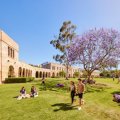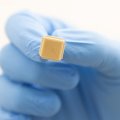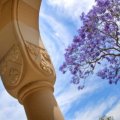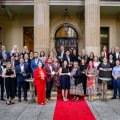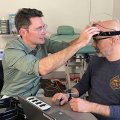Dr Gwen Lawrie and Dr Kirsten Zimbardi are advancing higher education teaching and learning practices as part of The University of Queensland’s Teaching Fellowship Scheme.
The scheme, now in its second year, aims to support emerging teachers and learning leaders to undertake a program of activities to advance teaching and learning in their faculties or disciplines.
As Teaching Fellows, Drs Lawrie and Zimbardi were required to identify a teaching and learning issue within their faculty or discipline, and show leadership in promoting and enhancing teaching and learning at UQ.
The Fellowships will be undertaken over a period of six months.
Drs Lawrie and Zimbardi were awarded UQ’s 2012 Teaching Fellows at a special ceremony on Wednesday, November 2, in the Eleanor Room of The UQ Club at the St Lucia campus as part of the University’s annual Teaching and Learning Week celebrations.
Dr Lawrie, from the School of Chemistry & Molecular Bioscience, will explore factors that enhance the sustainability of embedded authentic assessment practices through a Scholarship of Teaching and Learning (SoTL) mentorship model.
This model involves other staff members including Dr Lawrie being on hand to guide academics as they implement new assessment based on latest educational research.
Since 2008, Dr Lawrie and colleagues have developed and embedded a number of teaching and learning initiatives in large, first-year chemistry courses at UQ, with positive feedback from students for these high-impact teaching and assessment practices.
Dr Lawrie said “high-impact” practices were those in which the student was an active, rather than a passive, learner, with an example being a collaborative group inquiry task in which students worked together over several weeks to develop an evidence-based response to a challenging contemporary question.
As a UQ Teaching Fellow, and in collaboration with Teaching and Educational Development Institute (TEDI) academics, Dr Lawrie will mentor course coordinators as they translate assessment into their new, first-year chemistry courses. The aim is to facilitate academic engagement in T&L activities and catalyse them in developing their own teaching and learning initiatives.
Dr Zimbardi, from the School of Biomedical Science, will investigate the impact of implementing and evaluating inquiry-based curricula on coordinators, tutors and students in the sciences.
Over the past 30 years, science education has moved towards models of inquiry-based curricula to equip students with the cognitive and problem-solving skills they will need as graduates to respond to the novel, complex and unstructured challenges of the 21st century.
Examples of the “inquiry-based curricula” in science at UQ include practical classes where students design their own research questions and experiments, conduct experiments in teams ranging in size from three to 70 students, and then interpret their findings and report these in a variety of forms.
In science at UQ, inquiry-based approaches have also been embedded in lecture classes, where students are actively working during the lecture – individually and collaboratively – to solve complex problems and discuss their approaches and findings.
Through the UQ Teaching Fellowship, and with guidance from Centre for Educational Innovation & Technology (CEIT) academics, Dr Zimbardi will use an innovative, technology-enhanced approach to critique the teaching and learning initiatives embedded in science courses.
Dr Zimbardi will collect videos of inquiry-based classes in action from the perspectives of the academics, tutors and students and upload these videos to an online site where the academics, tutors and students will add annotations to highlight what participating in inquiry-based curricula really meant to them.
This will firstly improve communication between these key stakeholders (eg, help academics to understand how the classes they have designed are being experienced by their students) therefore facilitating improvements to curricula. Secondly, some of the annotated videos will also be made publicly available therefore improving visibility of inquiry classes “in action” and promoting UQ’s teaching and learning innovations nationally and internationally.
Media: Shirley Glaister at UQ Communications (3365 1931 or s.glaister@uq.edu.au).
.jpg)
